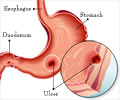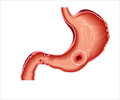Q: Which Doctor should I consult if I have peptic Ulcer?
A: You should see a Medical or General Gastro-entrologist. If they are not available see a General Physician
Q: Is Gastric Cancer caused by Helicobacter pylori?
A: Yes, Gastric Cancer is caused by H. pylori infection, by a stepwise progression from chronic superficial gastritis to intestinal type cancer. There is increased prevalence of H. pylori association with gastric cancer. It is estimated that H. pylori infection increases the risk of gastric cancer 6 times. There have been studies on gastric MALT [Mucosa Associated Lymphoid Tissue] lymphoma which is caused by H. pylori, however research has shown that 5 of 6 early lymphomas regressed after eradication of H. pylori.
Q: What is Urea breath test?
A: A urea breath test is an effective diagnostic method for H. pylori detection. This test is also used for studying the prognosis of treatment. Non-radioactive carbon (carbon -13 or carbon -14) is tagged with urea which is contained in the water which the patient drinks. If H. pylori bacteria are present in your stomach, they will break down the urea, eventually causing you to exhale carbon dioxide that contains the tagged carbon. If you have no H. pylori bacteria in your stomach, the urea does not break down and instead passes out of your body in your urine. This test is accurate and safe. (See also, lab test - Urea breath test).
Q: What is the role of Urease enzyme?
A: The enzyme urease plays an important role in colonizing of H. pylori in the acidic gastric environment of the stomach. The enzyme is found readily on the surface and in the cytoplasm of the bacterium. Urease helps digest urea to produce ammonia and bicarbonate. Ammonia generated around the bacterial cells neutralizes gastric acid. This process benefits H. pylori in colonization, but is toxic to gastric epithelial cells.
Q: How Prevalent is the infection of H. pylori in Humans?
A: The prevalence of H. pylori infection in humans correlates with socioeconomic status and age. Low socioeconomic status predisposes to infection. Infection is common in children#$#s and adults of developing countries. In developed countries, the proportion of people infected with H. pylori has fallen, and gastric and duodenal ulcers and stomach cancer have become less common.
Q: What are emergency symptoms of H. pylori infection?
A: Emergency Symptoms due to H. pylori infection may occur due to damage in the stomach or duodenal wall, or bleeding which occurs due to damage in blood vessels, obstruction of the stomach path may also lead to emergency symptoms. The emergency symptoms are Sharp, sudden, persistent stomach pain, bloody or black stools or bloody vomit.
Q: What is CLO testing?
A: The CLO test is for Campylobacter-like organisms. At the time of endoscopy and biopsy, a pinch of tissue is removed and placed in a test solution containing urea, a pH colour reagent. The presence of H pylori results in hydrolysis of urea solution by Urease produced by H. pylori, resulting in a colour change due to pH change which occurred due to hydrolysis of neutral urea to alkaline ammonia (usually from yellow to red). In infected tissues the change in colour occurs within about one hour.
Q: What is MALT?
A: Mucosa-associated lymphoid tissue is one of the major secondary lymphoid organs, along with the lymph nodes and spleen. Mucosa-associated lymphoid tissue (MALT) is scattered along mucosal linings and protects the body from antigens entering along mucosal surfaces. Tonsils, Peyer patches underlying the small intestine, and the vermiform appendix are examples of MALT.
Q: What is dyspepsia?
A: Dyspepsia is a pain or an uncomfortable feeling in the upper middle part of the stomach. People of all age groups can get dyspepsia. About 1 of every 4 persons gets dyspepsia at some time. Symptoms of dyspepsia are burning stomach pain, fullness of stomach, Heartburn, stomach upset and vomiting. The causes of dyspepsia may be stomach ulcer or acid reflux disease.



















